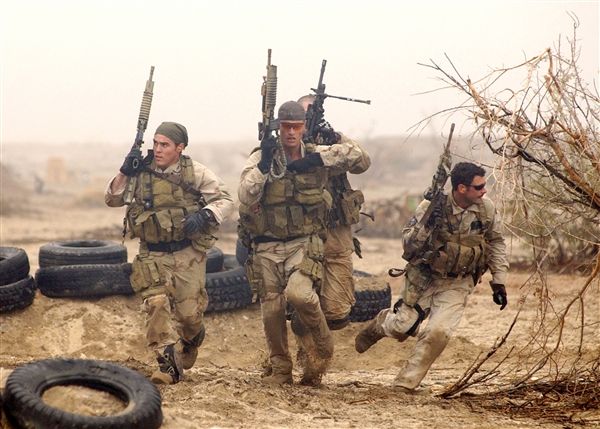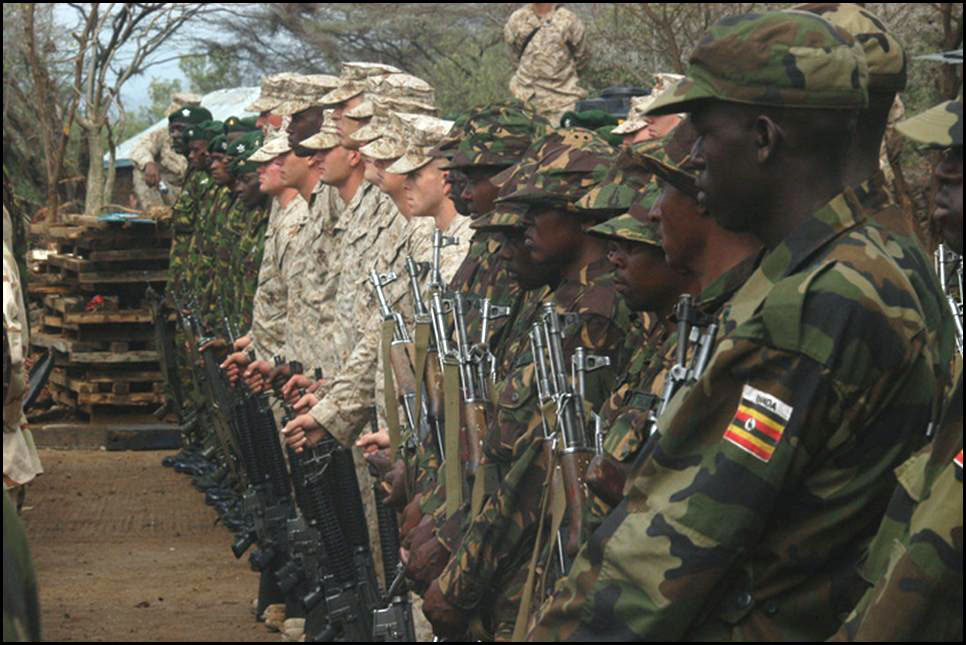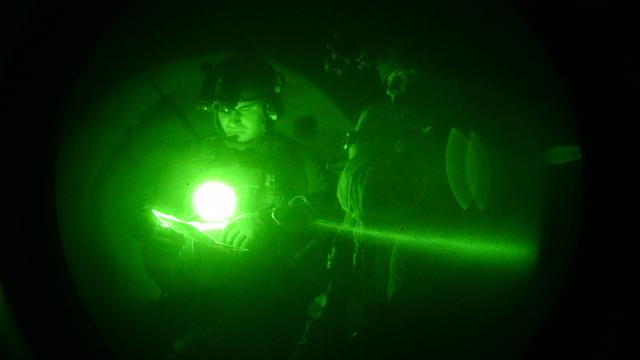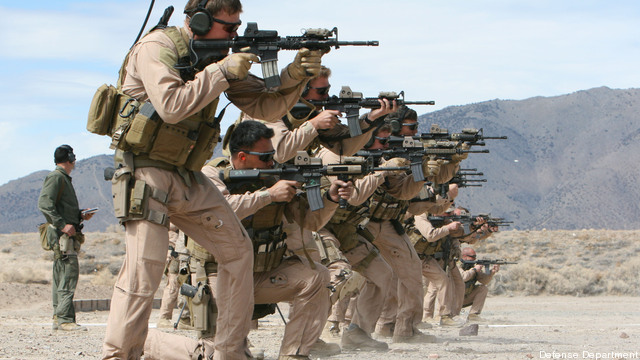Five Profound Choices Special Ops Face Next Year
Posted on
U.S. special operations forces face decisions of profound consequence in 2014 after having been empowered by a series of policy directives taken over the past year. One of these directives has been, contrary to the caricature of unilateral commando forces popularized by video games such as Call of Duty, an unequivocal message from… Keep reading →
Somali Raid: The Long, Quiet Campaign Behind Friday’s SEAL Strike
Posted on
WASHINGTON: Friday’s Navy SEAL raid aimed at capturing the Somali terrorist known as Ikrimah is a glimpse at the future of American warfare, one where a small US combat presence is boosted by widescale support to local forces who bear the brunt of the fighting. The raid itself came like a blitzkrieg from the blue… Keep reading →
The Fiddler Crab Effect: State, AID, NSC Can’t Keep Up With DoD
Posted on
[UPDATED with Gen. Hayden’s comments] Frantic diplomacy seems to have forestalled US military action in Syria – for now. But we stumbled into negotiations at the last minute, only after President Obama had threatened strikes and asked for a vote authorizing the use of force, when Secretary of State John Kerry made an off-the-cuff, off-message… Keep reading →
The Future of Special Operations: Lawrence of Arabia, Kim & 007
Posted on
WASHINGTON: The future of Special Operations Forces may look less like Zero Dark Thirty and more like Lawrence of Arabia or Rudyard Kipling’s Kim – with just a dash of 007. It’s a future that builds on the last ten years of raids and advisor missions, then adds solo operators in foreign lands, proxy wars… Keep reading →
Special Ops Office Needs To Grow; Meet Adm. McRaven’s Favorite Pundit, Linda Robinson
Posted on
WASHINGTON: When Linda Robinson speaks, special operators listen. The “silent professionals” are — for good reason — traditionally tight-lipped. The chief of Special Operations Command, Adm. William McRaven, proved that again today during a panel at the Wilson Center, giving eloquent non-answers to questions about what might transpire in Syria, Afghanistan, and Yemen. But McRaven… Keep reading →
Special Operations: What New Powers They Need From Congress & Pentagon
Posted on
WASHINGTON: America’s commandos have been darlings of the Congress, Pentagon, and the media since 9/11. Now, as Special Operations Forces reorient from Iraq and Afghanistan to lower-profile missions worldwide in places like Mali, they will need new sources of funding and new legal authorities — changes that may rub both Congress and the four armed… Keep reading →
Reps. Mac Thornberry, Adam Smith Lead House Push For More Foreign Military Training; Leahy Amendment Targeted
Posted on
CAPITOL HILL: Sequestration, Continuing Resolution, and snow be damned; the House Armed Services Committee met this morning to wrestle with long-term strategy. In a hearing not only overshadowed but outright interrupted by the House’s desperate effort to band-aid the budget crisis, top HASC leaders from both parties argued for expanding the military’s authorities to work… Keep reading →
Mattis: Keep 13.6K Troops In Afghanistan, Keep Talking With Iran & Keep Out Of Syria
Posted on
 [updated Tuesday, March 6 with Gen. Mattis’s remarks to the House Armed Services Committee] CAPITOL HILL: The US should keep 13,600 troops in Afghanistan to advise and assist the Afghan forces after American combat brigades withdraw in 2014, about a quarter of the current troop level, said Central Command chief Gen. James Mattis, giving his personal recommendation — not the Administration’s final decision — after prodding from the Senate Armed Services Committee Tuesday. Rumored figures have been significantly lower. “We have to send a message of commitment,” declared Mattis, who will soon retire. But with the Navy halving its aircraft carrier presence in the Gulf and all the services cutting corners in expectation of a continued budget crunch, it’s getting harder to project resolve.
[updated Tuesday, March 6 with Gen. Mattis’s remarks to the House Armed Services Committee] CAPITOL HILL: The US should keep 13,600 troops in Afghanistan to advise and assist the Afghan forces after American combat brigades withdraw in 2014, about a quarter of the current troop level, said Central Command chief Gen. James Mattis, giving his personal recommendation — not the Administration’s final decision — after prodding from the Senate Armed Services Committee Tuesday. Rumored figures have been significantly lower. “We have to send a message of commitment,” declared Mattis, who will soon retire. But with the Navy halving its aircraft carrier presence in the Gulf and all the services cutting corners in expectation of a continued budget crunch, it’s getting harder to project resolve.
“A perceived lack of an enduring US commitment” is the biggest danger to American interests in the Central Command region, which sprawls from Egypt to Pakistan, Mattis told the House Armed Services Committee on Wednesday. While the drawdown in Afghanistan unnerves some allies, he said, “our budget ambiguity right now is probably the single greatest factor. I’m asked about it everywhere I go in the region.”
“Already, sequestration is having an operational impact in the CENTCOM area” with the indefinite postponement of the aircraft carrier USS Truman’s deployment to keep an eye on Iran, lamented SASC’s chairman, Carl Levin. Facing a funding shortfall from both the automatic cuts known as sequestration and the Continuing Resolution now funding the federal government I the absence of proper 2013 appropriations, Navy will keep Truman stateside, albeit ready for rapid deployment in a crisis.
Mac Thornberry: Congress Must Empower Special Operations – EXCLUSIVE
Posted on
WASHINGTON: Tomorrow morning, overshadowed by sequestration, the House Armed Services Committee will hold a rare full-committee hearing on a topic that would normally be high-profile, even explosive: whether to give the Defense Department, and especially its elite special operators, broader legal authority to work with foreign forces worldwide, from Colombia to Mali to the Philippines.… Keep reading →
Adm. Bill McRaven: SOCOM Struggles With CR, Sequester
Posted on
[UPDATED with comments from Maj. Gen. Michael Repass, SOCEUR]WASHINGTON: Even the celebrated Special Operations Command is feeling the budgetary bite of Washington dysfunction, SOCOM chief Adm. William McRaven said today. “I haven’t gone through the list yet,” McRaven told reporters accosting him after a speech, but SOCOM will make cuts “just like the services” (the… Keep reading →





